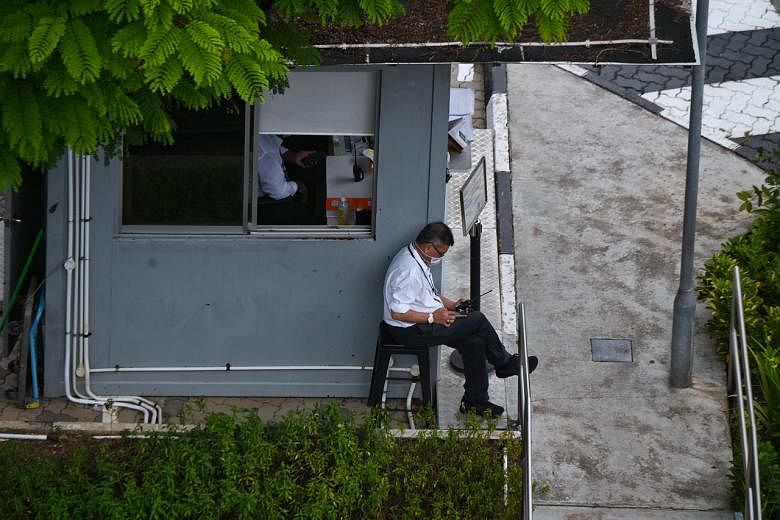SINGAPORE - Private sector security buyers shy away from outcome-based contracts (OBCs) because of a lack of awareness and expertise in the field, said some industry players.
OBCs focus on expected outputs and outcomes rather than manpower needs. They are unlike traditional, manpower-based contracts, where a fixed number of security personnel are deployed.
Thus, OBCs can offer innovative solutions that integrate technology, as well as job and process redesign, so as to improve productivity and security outcomes.
"What is lacking is a more targeted approach because, while there have been pushes in the media and such, many private organisations are just not aware (of what OBCs can do for them)," said Mr Dex Yuan, director of Security 4.0, a training and consultancy firm in the security field.
"We require a coordinated effort from the Government, security associations and the union, rather than individual actions."
He was speaking to The Straits Times on the sidelines of the Outcome-Based Contracting Conference at the Marina Bay Sands Expo and Convention Centre on Friday (Nov 26).
The event was part of a three-day mega expo, Architecture and Building Services 2021, which opened on Nov 24. The expo returned after a two-year hiatus because of the Covid-19 pandemic.
Another issue cited was a lack of expertise, and that clients are not yet convinced of OBCs' merits.
Mr Derek Chew, general manager of FormTeam Consultancy, which has been using OBCs since early 2020, said: "We not only had to convince internal operations teams and officers, but also clients that OBCs work...
"With the help of government grants... both buyer and seller do not have to bear the full implementation and upgrading costs (involved)."
Delivering the main address at the conference on Friday, Minister of State for Home Affairs Desmond Tan cited FormTeam as a promising example.
The firm uses technology to handle 24-hour command centres and visitor management systems, and some senior security officers at sites under its purview have body-worn cameras.
Staff can monitor several condominiums at the same time via closed-circuit television cameras from one central command centre.
Video analysis and tripwires that go off if a perimeter is breached help the company to monitor premises such as commercial buildings, warehouses, hospitals and football clubs.
"FormTeam's experience illustrates how it is possible for big and small players alike to enhance your processes, by optimising manpower at potentially lower long-term costs, without compromising security," Mr Tan told conference attendees.
With the new processes in place, FormTeam, which has 200 employees, saw productivity gains of more than 80 per cent as officers spend less time on manual tasks. It has also saved on manpower costs as its current number of officers can be deployed to different, and more, sites.
Mr Tan said the Government aims to "move towards a 100 per cent adoption rate of OBCs in the next few years".
A security industry survey conducted by the Ministry of Home Affairs last year showed that seven in 10 service buyers plan to adopt OBCs in the next two years.
While Mr Tan said this is "very encouraging", he also noted that more buyers said they would do so when they are more familiar with what these contracts entail.
Speaking at the conference, Security 4.0's Mr Yuan noted that with wages for security officers expected to go up from next year, firms should take more concrete steps to adopt OBCs.
Under the Progressive Wage Model, private security officers will see their wages rise by 6.6 per cent on average from 2022 to 2028.
On the upside, the higher wages may motivate staff to upgrade their skills and embrace technology, he said.
Friday's conference also saw the Association of Certified Security Agencies launching a step-by-step guide on OBCs.
In addition, the Security Association Singapore next year plans to launch an online outcome-based tender generator and repository called OBX.
"This will provide an easy-to-use platform that will help buyers make the jump to OBCs," said Mr Tan.


